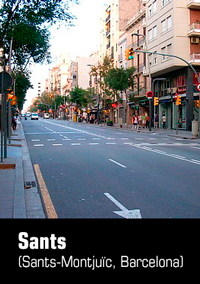 Although Sants is a traditional working-class neighbourhood, it has not been hit extremely hard by the recession. It has proven to be less vulnerable than Nou Barris Nord or the South Bronx. Nevertheless, the neighbourhood is poorer now than eight years ago; unemployment has significantly increased, numbers of small businesses have declined and foreclosures rose following the crash, especially in the poorer areas of the neighbourhood.
Although Sants is a traditional working-class neighbourhood, it has not been hit extremely hard by the recession. It has proven to be less vulnerable than Nou Barris Nord or the South Bronx. Nevertheless, the neighbourhood is poorer now than eight years ago; unemployment has significantly increased, numbers of small businesses have declined and foreclosures rose following the crash, especially in the poorer areas of the neighbourhood.
With its character of a small town within a city, Sants has retained a strong sense of belonging among its residents and its social organizations. The area has accumulated the experience of numerous historical struggles and an extremely high level of political activism has developed. Several generations of activists now overlap in Sants. The achievements of these generations, and the social learning stemming from them, have endured while, at the same time, a diverse mix of social organizations not only coexist but also tend to collaborate in order to campaign for neighbourhood improvements or jointly develop community-based activities.
Socially innovative initiatives readily emerge in a context which affords them the potential to be effective and to grow in scale. Social innovation in Sants is not something new. It is not a response to the post-recession situation in the area, but rather the result of a tradition of collective action from below which is historically rooted, diverse and politicized. Thus, in Sants we can see a tradition of cooperativism, self-management and self-organizing. This is a tradition of alternative action, flourishing in the local civil society and both distinct from the state and outside of the market. After the Great Recession new initiatives emerged which have merged old and new grassroots movements and have taken advantage of all the knowledge accumulated through older initiatives in the area. Moreover, the neighbourhood is home to an economically precarious but culturally important class of people; young, well-educated, politicized people with ideas that go beyond the mainstream. This class of people is playing a significant role in developing some of the social responses.